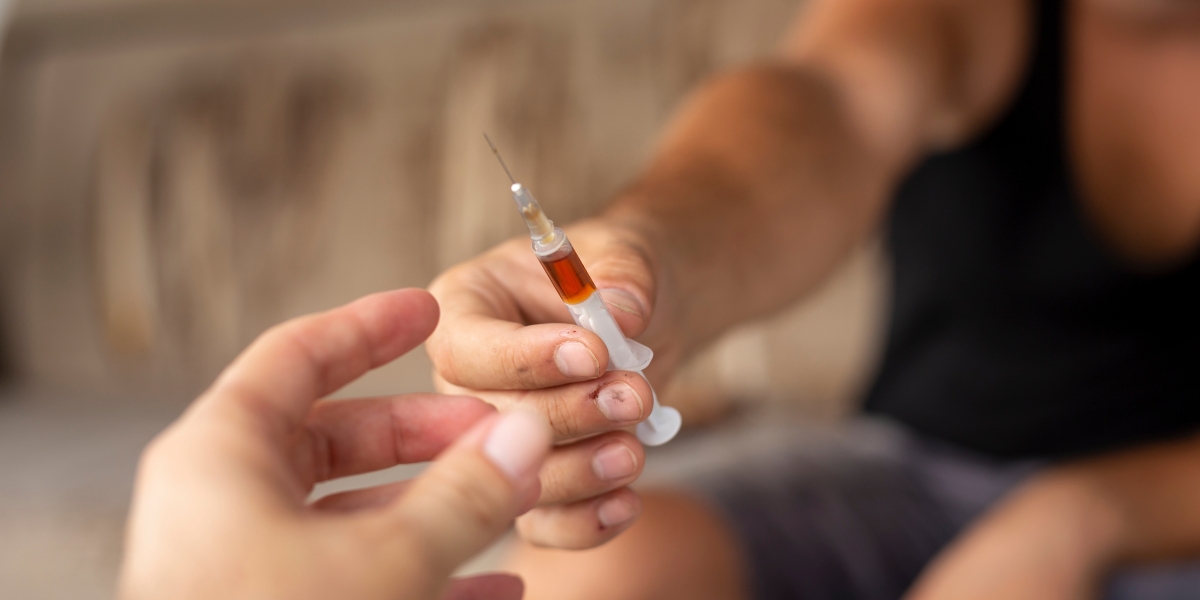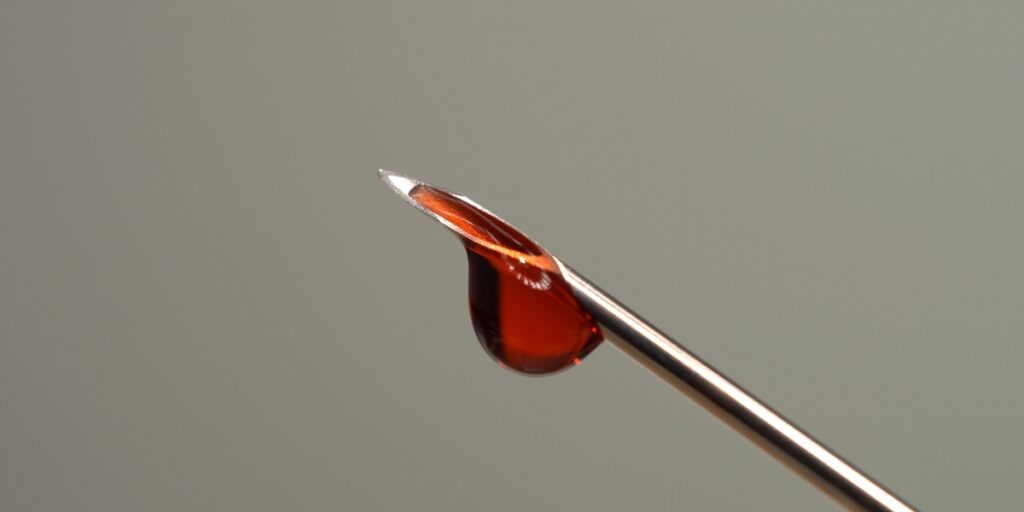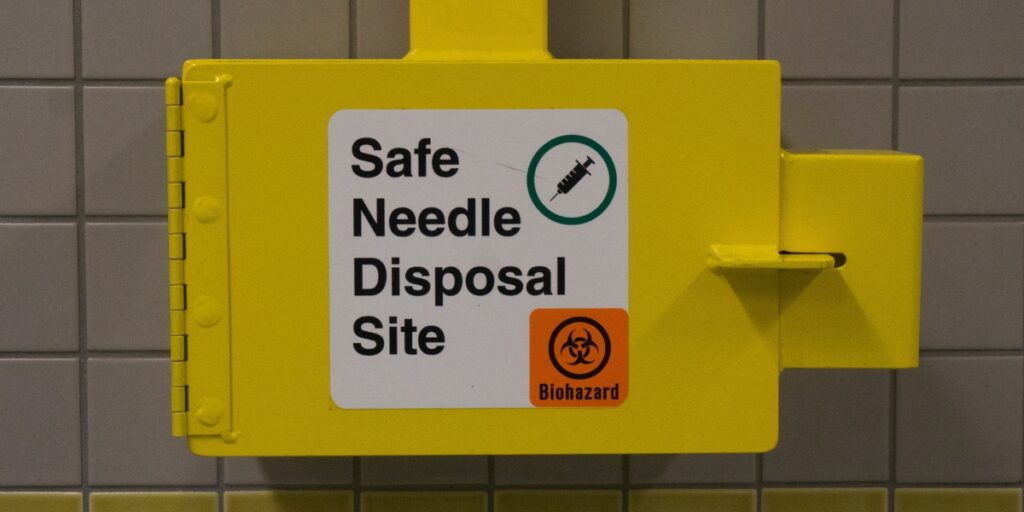Needle-Sharing Diseases

Every method of drug use comes with many risks; injecting drugs has the unique and additional risk of contracting needle-sharing diseases. Many intravenous drug users are unaware of the dangers of sharing used needles. Even drug users who attempt to clean needles between uses are rarely able to do it well enough to eliminate all traces of infected blood.
People who inject drugs into their bodies, or injected drug users, are diverse and complex, but they all face high rates of infections and blood-borne diseases every time they reuse or share a needle. Almost any drug can be injected— crack, benzodiazepines, heroin, and other opioids.
Most diseases contracted from sharing contaminated needles are treatable, if not curable; however, treatment often requires making life changes and sticking to a health care and medication routine, something that untreated addiction makes nearly impossible.
Needle-Sharing Among Drug Users
Needle and syringe sharing among injected drug users is a common practice that causes an increased risk of contracting infectious diseases, including bacterial infections, sexually transmitted diseases, and blood-borne diseases. The National Institutes of Health demonstrated studies showing that 70.4% of intravenous drug users reported recent needle sharing.
In the United States, most places have laws surrounding syringes and require a prescription. Even with a prescription, the cost can be prohibitive. These rules and regulations make needles hard to find for people who inject drugs, so many prefer to reuse and share needles rather than risk being unable to get high because they don’t have injection equipment available.
Furthermore, drug cravings and withdrawal come on quickly. Many injected drug users can only think about making them go away as fast as possible and will use the closest syringe available, usually one someone else has already used.

Blood-Borne Diseases from Sharing Needles
Blood-borne diseases from sharing needles can go undetected in drug users for months before symptoms develop. Even people who swear they are healthy or only share needles with people they trust are at risk of contracting infectious diseases. There is no such thing as safely sharing syringes.
Common blood-borne diseases and infections in people who inject drugs include:
- Hepatitis B
- Hepatitis C
- Bacterial infections that cause endocarditis, or heart failure
- Human immunodeficiency virus (HIV)
- Acquired immunodeficiency syndrome (AID), the result of untreated or end-stage HIV
Many people associate HIV and hepatitis with sexually transmitted diseases. While injected drug users engage in high rates of risky sexual behavior, most contract hepatitis and HIV infections from contaminated needles and other paraphernalia.
More than a quarter of HIV /AIDS cases in the United States trace directly back to injection drug use. Intravenous drug users are also at risk of contracting non-blood-borne diseases and disorders like tetanus, wound botulism, and gangrene.
Needle Exchange Programs
Needle exchange programs (NEP) or syringe services programs (SSP) help users access sterile syringes and other injection equipment and safely dispose of their used ones without fear of judgment or legal repercussions.
The Centers for Disease Control and Prevention (CDC) has directly linked needle exchange programs to lower rates of hepatitis and HIV transmission in drug users. As well as reducing needle sharing, programs that provide clean needles also teach harm reduction and substance use prevention techniques. They also offer referrals to addiction treatment programs when someone decides they are ready to take that step.
Harm Reduction Facts
The pushback against needle exchange programs in the United States comes from a profound misunderstanding and stigma surrounding addiction and drug use. Below are facts about needle exchange programs and how they improve public health and safety:
- In one year, NEPs safely discarded 25 million syringes that otherwise would have been in the trash or on the street
- Most NEP centers offer health screenings and education, improving overall safety and quality of life for drug users
- NEPs have reduced HIV transmissions to 1/3, down from 2/5 in people who inject drugs
- NEPs cost roughly $20 per drug user as opposed to an HIV/AIDs infected patient that costs up to $120,000 annually in healthcare costs
- Injected drug users that participate in NEPs are five times more likely to seek substance abuse treatment
Harm reduction centers and needle exchange programs are a helpful stop-gap for people who aren’t ready or able to access a treatment program; however, the only 100% way to stay safe from needle-sharing diseases is to overcome addiction.

Substance Abuse Treatment
If you or a loved one are struggling with substance abuse, help is available.
At Northridge Addiction Treatment Center, we treat all aspects of your addiction with only scientific, evidence-based therapies and treatment programs. Our medically licensed and accredited staff is experienced in treating and managing health complications caused by injection drug use.
We provide onsite medical detox and ensure your withdrawal is safe with 24-hour medical care and professional support. Our residential treatment center educates and empowers you to take charge of your recovery and health using the skills and techniques you’ll learn during your time with us.
Reach out today to speak with one of our caring treatment specialists about starting on your path to a life free from substance abuse.
Find Meaningful Recovery
Our caring and compassionate specialists are eager to help you comfortably navigate this journey to recovery. Our individualized treatment plan, programs, and therapies may be a perfect match for you or your loved one. Let us assist you in living the happy life you deserve. It starts with a phone call.




